10 Ways to Stop Stress Eating

It’s an all-too-familiar scenario: Your arm reaches into your cabinet, seemingly on its own, to retrieve a bag of chips, a bit of chocolate candy, or a cookie you had stashed for later.
Before you know it, the treat is in your mouth. You feel a rush of excitement, and then a calmness, which is followed by guilt. Eventually, you’re back to feeling anxious, which triggers the stress eating cycle all over again.
And it's not like we're eating vegetables. People tend to eat sugary, junky food when they're stressed out. This kind of food actually reduces levels of the hormone cortisol in your bloodstream, thus relieving stress temporarily. That makes you seek food again when you're under pressure.
Not to mention the fact that "we're wired to eat as much as possible in order to put on weight to ensure survival," points out Andreas Michaelides, PhD, chief of psychology at the weight loss program, Noom. "And we're living in an era where food is readily available." Never in history has there been so much food, so handy. Which is great when you're in a rush and don't have time to go out and hunt and gather. But not so great when it's there, and you're there, and you're tired, had a tough day, a big conversation, or any experience that leaves you a lot or a little stressed out.
But you can short-circuit the eat-guilt cycle and stay healthy with these tips from dietitians and food psychologists.
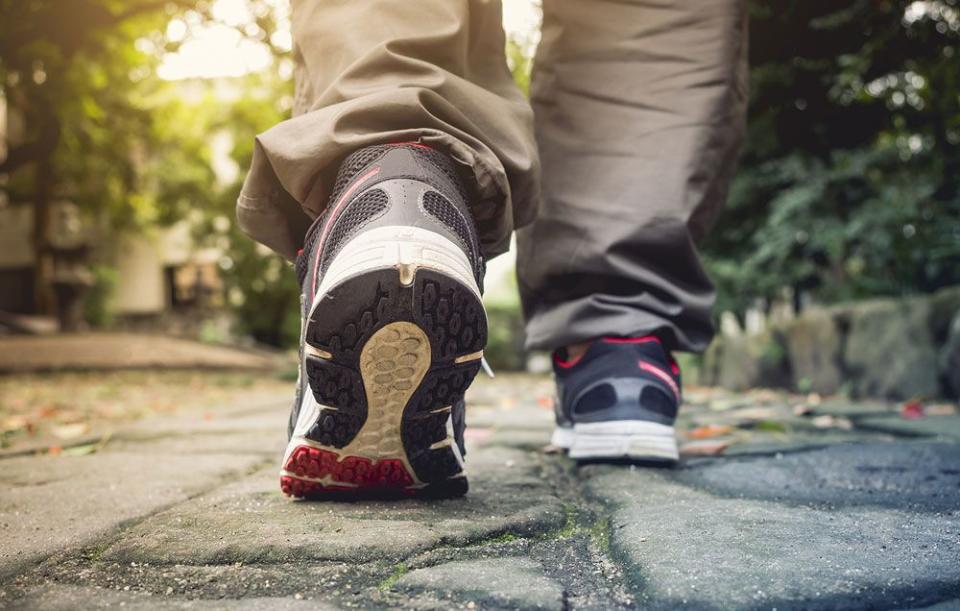
“When the urge to eat out of stress, boredom, sadness, or another emotions hits, I get up and go for a walk or run,” says Jessica Fishman Levinson, M.S., R.D.N., C.D.N., culinary nutrition expert.
“Exercise releases endorphins that can stimulate relaxation," she says. And if you can get outside, the fresh air is also a natural stress reducer.
In fact, walking for just 15 minutes can curb cravings for sugary snacks, according to one Austrian study. And it can help relieve the stress itself. Can't get out? You don't have to. Just stand up and get moving in one way or another.

“Eating never solves the problem that made you stressed in the first place,” says Deborah Beck Busis, LCSW, director of Beck Diet Programs, a CBT approach to weight loss, based in the Philadelphia area. But it can create new ones: “and now you have the problem of sabotaging your weight loss,” she says.
But you can defend against stress eating by deciding what you’re going to do instead. Sometimes when you’re stressed, you need to get extra energy out. Other times, you’re eating because you need distraction.
Either way, says Busis, you need to make yourself some lists of what you’re going to do when you want to reach for food. If you need to expend some energy, get up and walk around. “I knew someone who did a plank every time stress mounted,” she says, “and they worked up to holding it for four minutes.”
If you need distraction, scroll through your phone and look at pictures of your last vacation, your pet, or your kids. Decide what you’ll do ahead of time, so you don’t reach for the chips or candy while you’re trying to figure out what else you could do.

When you're in the throes of stress, the parts of your brain that might keep you from eating something you hadn't intended to eat might be offline, says Dr. Michaelides.
So if you know you're going to eat, it's critical to get to know your triggers for stress eating so you can make a healthy plan when those triggers fire you up. If you usually cruise around for something to munch on at 3 PM when work stress builds to a tipping point, then plan what you'll eat at that time that's not just whatever chocolate or chips or other snacks are lying around. "The key here is to make your food decisions ahead of time," Dr. Michaelides says. "The more you can do that, the less likely it is that you're going to make a food decision in the moment that you're going to regret later on."
If being tired at night sends you to the refrigerator to find something that you think will help you wake up, then decide what that snack could be that you'll feel good about...or just plan to go to bed instead of to the kitchen again.
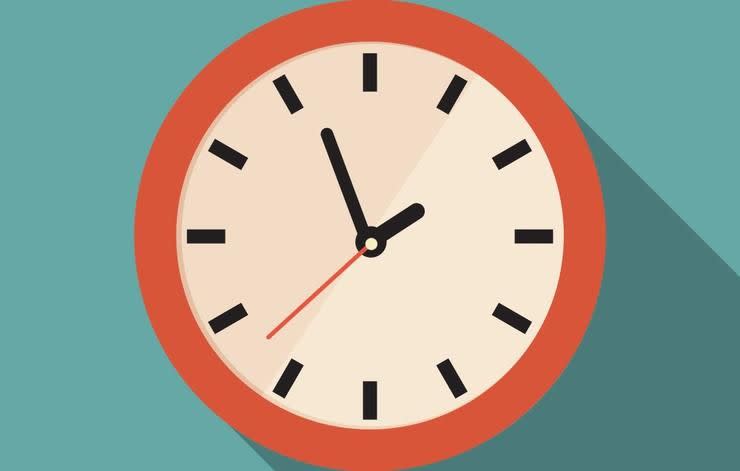
“Research indicates that the pleasure you get from eating comfort foods lasts only three minutes,” says Susan Albers, Psy.D., psychologist at the Cleveland Clinic and New York Times Bestselling Author of Eating Mindfully.
“Keeping this number front and center in my mind is helpful. I say to myself, ‘what is going to make me feel better for longer than 3 minutes?’ Usually, it’s not a cookie,” she says.
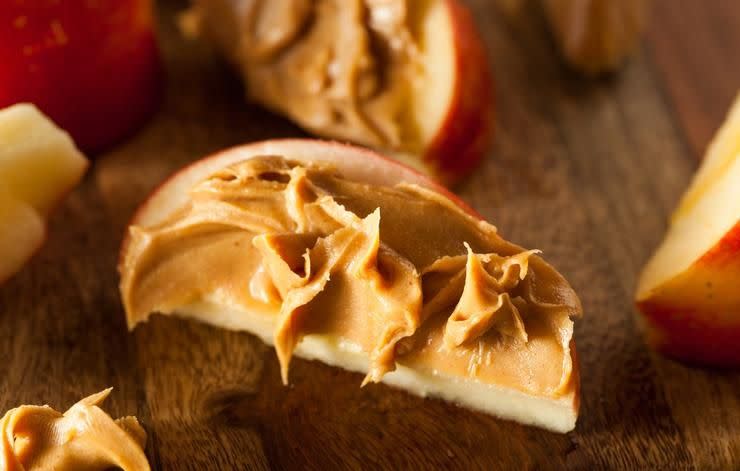
If you’re the type of person who tends to eat in response to stress, make sure you have some low-calorie finger foods on hand such as baby carrots, apple slices, or celery, suggests Jennifer Nasser, Ph.D, R.D., associate professor of nutrition sciences at Drexel University.
And consider adding some protein in the form of nut butters to boost satiety.
“If you prefer a sweet treat, mix something sweet with something protein-rich (think cottage cheese with honey and a dash of cinnamon),” she says. “That way you’ll get the sweet taste in addition to fullness signals that protein sends to the brain to get you to stop eating.”

“Think of what you’d really, really enjoy,” says Wendy Bazilian, Dr.P.H., R.D., coauthor of Eat Clean, Stay Lean. Is that a piece of chocolate, or a small bowl of your favorite ice cream?
“Whatever it is, plan to treat yourself once or twice a week,” she says. Set your sights high and don’t settle for just any old junky food. Go for the stuff that really satisfies you.

Beware eating when you're doing something else at the same time, like watching TV, reading, or driving. That makes you less aware of what you're consuming, explains Dr. Michaelides. And the next thing you know, the bag's empty but there's still half of the episode or chapter left.
When you eat, sit down and enjoy it and don't let yourself be distracted by other things. You'll enjoy your food more, too.

“If I have a mug, some boiling water, a cinnamon stick, and a teaspoon of honey, then I have what I need to curb sugar cravings when stressed,” says Dr. Albers.
“Cinnamon has been clinically shown to help keep insulin levels in check,” she says.
Consider adding a sprinkle to your morning coffee, too.
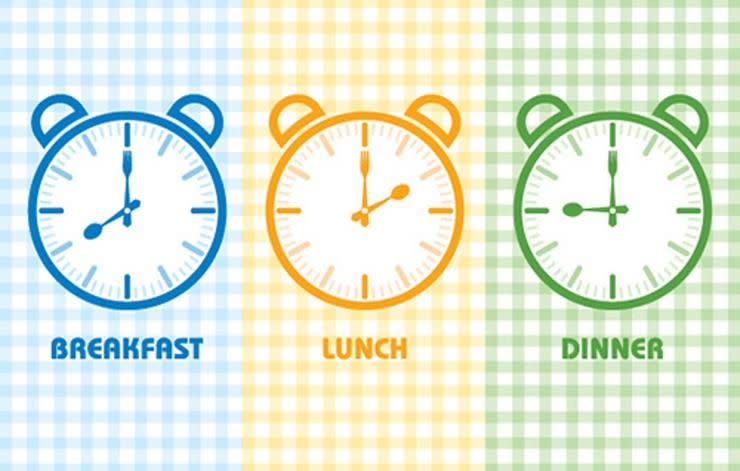
Good nutrition is incredibly important for stress management—just consider the fact that people who consume inadequate amounts of magnesium (which is most of us) may experience increased sugar cravings.
But it’s hard to get all the nutrients you need if you skip meals, says Bazilian.
Related: 6 Things I Learned When I Tried Intermittent Fasting For a Week
Plus, skipping meals can cause dips in blood sugar, which can lead to cravings and make stress eating more likely to occur.
If your schedule is unavoidably hectic, make a bunch of pre-portioned healthy snacks that can sub for a larger sit-down meal—think almonds and raisins, plain yogurt, fresh fruit, individually portioned 1 ounce cheeses and whole grain crackers.
Then have them at the ready so they’re as convenient for you to eat as chips, pretzels, candies, cake, and donuts.
The article 12 Ways to Stop Your Stress Eating, According To Nutritionists and Food Psychologists originally ran on Prevention.com.
p.p1 {margin: 0.0px 0.0px 0.0px 0.0px; font: 14.0px Arial; -webkit-text-stroke: #000000}span.s1 {font-kerning: none}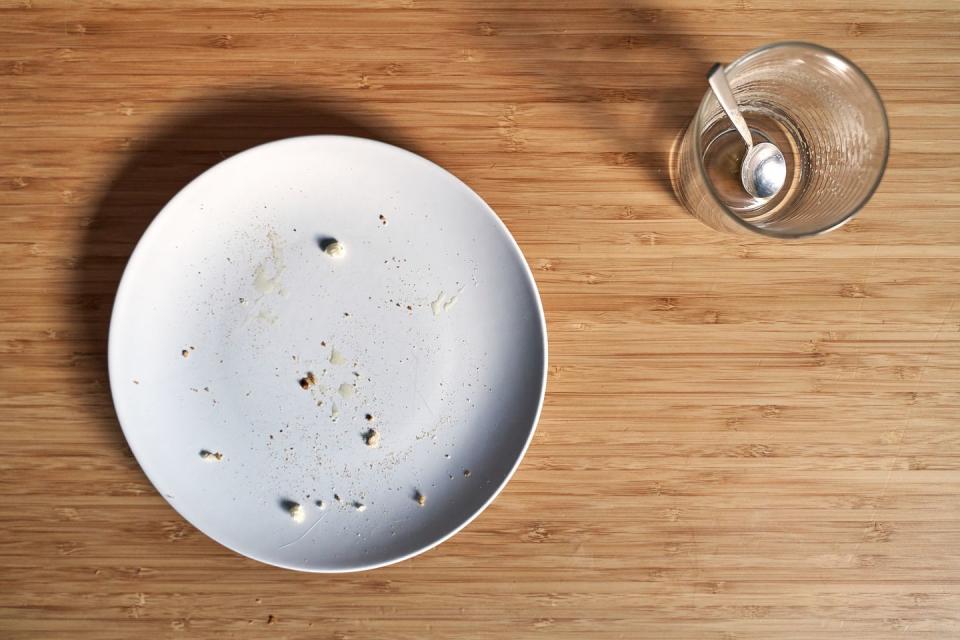
Eating something you didn't intend to eat—or even eating a whole lot of what you didn't intend to eat isn't a failure, it's an opportunity, explains Dr. Michaelides.
"The spirit of experimenting and not giving up when you fail is the most important skill that you can have," he says. Instead of thinking "I'm a failure and I'm never going to figure this out," he says, "consider telling yourself, 'I didn't achieve what I wanted. Let me understand what happened and why I did this thing in a way that wasn't where I wanted it to go.' Then think about what you're going to try next time, without judging yourself." Treat it as an experiment and an opportunity to find your way to habits that steer you toward your healthiest self (and away from the stress eating).
10 Ways to Stop Stress Eating
It’s an all-too-familiar scenario: Your arm reaches into your cabinet, seemingly on its own, to retrieve a bag of chips, a bit of chocolate candy, or a cookie you had stashed for later.
Before you know it, the treat is in your mouth. You feel a rush of excitement, and then a calmness, which is followed by guilt. Eventually, you’re back to feeling anxious, which triggers the stress eating cycle all over again.
And it's not like we're eating vegetables. People tend to eat sugary, junky food when they're stressed out. This kind of food actually reduces levels of the hormone cortisol in your bloodstream, thus relieving stress temporarily. That makes you seek food again when you're under pressure.
Not to mention the fact that "we're wired to eat as much as possible in order to put on weight to ensure survival," points out Andreas Michaelides, PhD, chief of psychology at the weight loss program, Noom. "And we're living in an era where food is readily available." Never in history has there been so much food, so handy. Which is great when you're in a rush and don't have time to go out and hunt and gather. But not so great when it's there, and you're there, and you're tired, had a tough day, a big conversation, or any experience that leaves you a lot or a little stressed out.
But you can short-circuit the eat-guilt cycle and stay healthy with these tips from dietitians and food psychologists.
Even when there's food (and stress) everywhere.
Solve the daily Crossword

